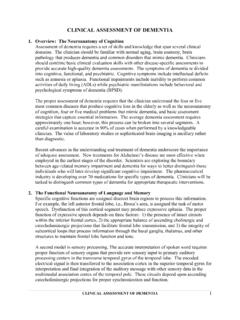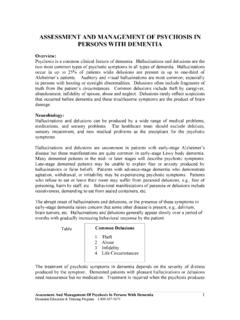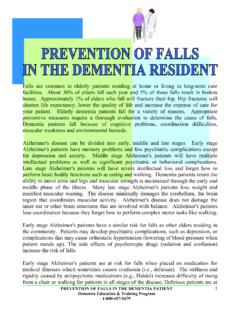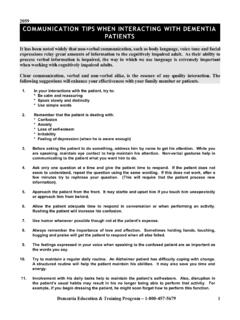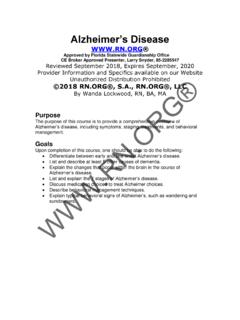Transcription of ALZHEIMER’S & DEMENTIA - Alzbrain
1 Dear Friend: alzheimer 'S. & DEMENTIA When a parent or other relative develops alzheimer 's disease or other DEMENTIA , it is a frightening time for the whole family. The Alabama LINE legislature, through its DEMENTIA Education & Training Act (DETA), and the 1-800-457-5679 staff of the DETA training program, wish to help you understand DEMENTIA - related diseases and connect you with resources in your community that can support you in caring for an alzheimer 's or other DEMENTIA patient. When you call, be prepared to provide Currently in Alabama, about 52,000 individuals have alzheimer 's disease.
2 The following Ten percent of Alabamians over he age of 65 and almost one-half of people information about the over age 85 will develop DEMENTIA . These statistics are frightening when you consider the aging of Alabama. By the year 2030, more Alabamians will be patient: over the age of 65 than under the age of 18. How long have you This packet of information is designed to provide you with pointers in caring for alzheimer 's patients, as well as to acquaint you with several new services notice a change in designed to help both professional and family caregivers manage alzheimer 's behavior?
3 And other DEMENTIA patients. Examples of First, the state DETA program has established a toll-free information and referral n umber, 1-800-457-5679, which individuals can call and receive behavior/environment basic information about alzheimer 's disease and other dementias, referral to changes local caregiving resources, and referral to local experts who can answer legal and medical questions. List of Second, the DETA program, housed in Tuscaloosa within the Bureau of medicines/diagnoses/ Geriatric Psychiatry, has developed a number of informational videotapes. recent lab work One of these entitled, alzheimer 's Disease: A Practical Guide , is available in every public library in the state.
4 Other tapes, which target high school and middle school students, sitters, law enforcement personnel, and pastors, are Physical Problems available through local alzheimer 's support groups and by calling the 1-800. Line. Third, the DETA program has developed a speakers' service, which is comprised of volunteers from throughout the state, who have received specialized training in alzheimer s disease and DEMENTIA . I ask you to take advantage of this comprehensive array of services and to encourage your state and local officials to develop more resources to care for elderly Alabamians with alzheimer 's disease or DEMENTIA .
5 Sincerely, Richard E. Powers, MD. Director, Bureau of Geriatric Psychiatry/DETA. 1. The DEMENTIA Education and Training Act (DETA) Speakers' Service is made available to groups and organizations throughout the State of Alabama. The purpose of this service is to increase public awareness and enhance individuals and family education regarding alzheimer 's disease and other dementias. Speakers available through this service represent a number of areas of professional and personal expertise. They may be family caregivers, professional caregivers, support group members, health professionals, or have a combination of these experiences.
6 It is through the DEMENTIA Education & Training Act, passed by the Alabama Legislature in 1993, that this service is available to the citizens of Alabama. Civic clubs, church groups, schools, and other organizations are encouraged to review the list of topics and to contact the DETA program about scheduling a speaker. To schedule a speaker or trainer to address your group, please contact the DETA. office, Bureau of Geriatric Psychiatry, Tuscaloosa, AL at (205) 759-0820. alzheimer 'S & DEMENTIA LINE --1-800-457-5679. TOPICS: WHAT IS DEMENTIA . alzheimer 'S: A PRACTICAL GUIDE.
7 THE FOUR A's OF alzheimer 'S. TIPS FOR THE CAREGIVER OF THE DEMENTED PATIENT. BEHAVIORAL MANAGEMENT OF THE alzheimer 'S PATIENT. RESOURCES IN ALABAMA: WHERE TO GO FOR HELP. EPIDEMIOLOGY OF DEMENTIA . DEMENTIA : FINANCING CARE. LEGAL ISSUES AFFECTING THE ELDERLY WITH DEMENTIA . DEMENTIA IS EPIDEMIC: SPREAD THE WORD (Tips for Promoting Public Information). LONG-TERM CARE. 2. Family caregivers must speak for patients who lose the ability to comprehend healthcare issues. These family caregivers have certain rights including: 1. The right to receive complete, unbiased information about every procedure proposed for their patient.
8 2. A complete description of short-term and long-term complications for every intervention. 3. The right to seek a second opinion about diagnosis and treatment. 4. The right to insist that healthcare professionals obey the patients' written advanced directives. 5. The right to assume the role as the expert on the patient's unwritten wishes about end-of-life issues. 6. The right to respectfully disagree with the medical team. 7. The authority to have the wishes of the patient honored. DEMENTIA EDUCATION & TRAINING PROGRAM-1-800-457-5679. 3. More than 80% of all nursing homes patients have some form of mental impairment.
9 Sixty percent (60%) of all nursing home patients have DEMENTIA . Most mental illness is unrecognized or untreated in the elderly. Alabama has a serious shortage of geriatric mental health professionals. Nursing home staff needs detailed training to deal with patients with mental illness. THE THREE D's OF MENTAL ILLNESS IN THE. ELDERLY. Depression Delirium DEMENTIA DEPRESSION IN THE ELDERLY. Depression is a biological brain disorder. Depression is not a normal part of aging. Depression is treatable. Seven to 12 percent of all people over the age of 65 become depressed. Suicide is one of the 10 leading causes of death in the elderly.
10 Thirty to 40 percent of all seriously medically ill elderly individuals suffer from depression. Most depressed patients cannot make themselves well. 4. Seventy to 90 percent of depressed elderly patients will improve with medication and other therapy. Most elderly depressed patients can be treated as an outpatient. Many medications such as antihypertensives cause depression. Some depressed elderly individuals need three or four types of therapy before they improve. DELIRIUM. Delirium is temporary confusion or intellectual impairment from medical problems. Delirium is reversible and common the elderly.
